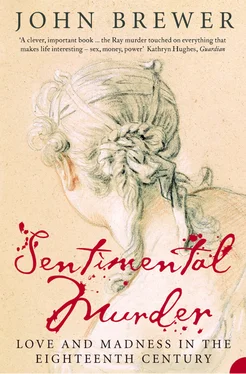1 ...7 8 9 11 12 13 ...19 This informal process of news-gathering supposed a very different relationship between the press and its readers than the print media have today. Those who read the papers – a broadly based group that extended well beyond the aristocracy, even if it did not include a great many of the poor – were also those who wrote them. The newspaper was not an authoritative organ, written by professionals to offer objective information to the public, but a place where public rumour, news, and intelligence could circulate as if it were printed conversation. Freedom of the press in this period meant not only freedom from government control but freedom of access – not just to information, but to the pages of the press itself in order to transmute opinions into news. The producer of a paper was not so much an editor, shaping its opinions, as a technician, making available a new means of transmitting the disparate opinions of the public at large. The press was thus very open to manipulation.
Many commentators believed that the enormous growth in news, fuelled by the business interests of the newspaper proprietors and lacking any check on its veracity, created a climate of scandal and sensation. Collecting so-called news, which newspapers quickly took up, copied and stole from one another, was often indiscriminate. Paragraph writers created press stories that played fast and loose with the facts and were frequently embellished. As one critic complained:
The general run of readers have not seen the paragraphical drudges , hurrying over the town for malicious materials, and eves-dropping at every door of intelligence; while another tribe of slaves , sit aloof , at the task of improvement and invention … nor are they perhaps aware that other inferior agents are constantly employed in picking up invidious anecdotes of domestic misfortune; and private imprudence . These hint-catchers have no sooner filled the budget to the brim, than their labours are delivered to the embellisher , by whom they are finished and arranged, and sent into the world 63 .
Commentators were especially concerned at how personal matters and private lives had become a staple of the press. Some blamed this new fashion on the political journalism of the 1760s, first perfected by John Wilkes in his weekly paper The North Briton , which combined political criticism with highly personal attacks on such figures as the Princess Dowager, George III’s mother, and the king’s favourite, Lord Bute, who was accused of being the Princess’s lover. Wilkes mixed sexual scandal with government policy. This was a familiar tactic in the histories of royal courts where women were often said to have had excessive influence because of their hold over male rulers. But Wilkes and his followers extended this tactic by attacking ministers and leading aristocrats for their private moral conduct, maintaining that this made them unfit for public office. This led to unprecedented exposure of the private lives of public figures. One critic of the ‘new journalism’ complained to the Morning Post :
The Political Controversy at the beginning of the Present reign, taught printers to feel their Power: we then first find Personal Abuse, unrestrained, stalk abroad, and boldly attack by Name the most respectable Characters. Your brethren were not idle in taking the hint: from that Period we find a material change in the stile of every News-Paper; every Public Man became an object of their attention; and many a sixpence has a Patriot earned, by Paragraphs, which a few years before, would have brought the Printer unpitied to the Pillory 64 .
The advent of the newspaper editor in the 1770s led to little change. The first major editor, the Reverend Henry Bate, used his Morning Post simply to perfect existing journalistic practices. He extended the coverage of his paper to include boxing and cricket as well as theatrical and art reviews; most notoriously, he made a part of the paper into a satirical scandal sheet, attacking individual men and women of fashion, hectoring his theatrical opponents (Bate was a minor playwright), and peddling the latest gossip. He was one of the models for Snake, the purveyor of poisonous rumour who inserts anonymous paragraphs in the newspaper in the opening scene of The School for Scandal (1777), Richard Brinsley Sheridan’s pointed satire of a society obsessed with ‘inventing, adding and 65 misrepresenting everything they hear, or their rage, folly, malice or prolific brains can suggest’. Bate deliberately cultivated notoriety, and fought a number of duels with readers who believed themselves maligned or libelled by his publication. Eventually he was imprisoned for accusing the Duke of Richmond of consorting with the enemy during the American war. Bate was said to take fees for publishing some paragraphs and agreeing to suppress others. He was also a client of the government. He had a pension of £200 a year from the secret service funds in return for keeping his ‘Newspaper open for all writings in favour of Government’. In 1781 he 66 was finally paid off with a gift of £3,250, so that he could purchase a handsome clerical living for himself.
Bate made little attempt to conceal the Morning Post ’s connection with Lord North’s administration, frequently beginning reports, ‘As well as our government can judge’, or ‘the government says’ or ‘we are authorized to say’. Bate knew Sandwich and seems to have dealt with him directly on a number of occasions. Lord Bristol, who led the attack on Sandwich in the House of Lords on 23 April, wrote on the following day to an opposition publisher, John Almon, asking him to insert his version of the debate in a number of newspapers ‘with[ou]t saying you had it from me’, to counter the influence of what he described as ‘Ld. SANDWICH’S Morning Post’. It is not surprising that the most sympathetic portrayal of Sandwich in the aftermath of the murder came from the pages of Bate’s paper. Conversely, the accounts of Hackman’s crime in the Gazetteer , the London Evening Post and the London Chronicle – all papers with which John Almon was connected and all associated with the parliamentary opposition – were markedly less sympathetic to Ray and Sandwich.
All the political parties tried to influence the press. Sandwich had been doing so for many years. In the 1760s he employed his chaplain, Dr James Scott, to write newspaper letters under the pseudonyms ‘Anti-Sejanus’ and ‘Old Slyboots’, that were some of the most successful political polemics of the decade. And he was not averse to planting paragraphs of news (as opposed to pieces of political commentary) in the newspapers, not as pieces of information but as ways of influencing opinion. Newspapers in the 1770s were halls of mirrors in which partial views and tendentious opinions were refracted so as to appear as transparent ‘facts’. As we enter them, we have to remember that nothing was quite what it seemed.
On 20 April 1779 the Gazetteer interrupted its report on Hackman’s final hours and execution to speculate on the nature of and motives for his crime. The author of this mélange of reporting and reflection was probably a Mr Newman of Guiltspur Street, who was paid occasional fees for items about trials and executions. ‘There is evidently a something ’, he mused, ‘hangs suspended in doubt, and remains unrevealed’ about the case. Hackman’s suicide note to his brother-in-law Booth, he remarked, ‘pours the Blessings of heaven on the murdered lady, and avows an intention of the murderer to kill himself only ’. Why, then, did he change his mind? ‘Love could not be the impulse – that passion might have led him to act the hero before his mistress; but the fondness, which dictated the affectionate sentence in his letter, and breathed preservation to the lady, can never be supposed to turn into resentment without a cause, and operate to her destruction .’ Perhaps the sight of Ray on Mr Macnamara’s arm drove him into a jealous rage. ‘But if so,’ the article asked, ‘why did he not confess it?’ The evidence of the two pistols was ambiguous, since the unreliability of firearms meant that many suicides armed themselves with more than one weapon. ‘There is certainly a part in his defense that requires explanation 67 ’, it concluded.
Читать дальше












